Peter MALONE
Nebanen/ Next Door
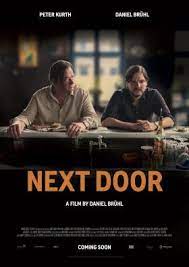
NEXT DOOR/NEBANEN
Germany, 2021, 92 minutes, Colour.
Daniel Bruehl, Peter Kurth, Rike Eckerman, Aenne Schwart, Gode Benedix, Vicki Krieps, Justine Hirschfeld.
Directed by Daniel Bruehl.
Nebanen/ Next Door is an unexpected cinema experience. It has been co-written, directed by, starring celebrated German and international actor, Daniel Bruehl.
In fact, the central character is called Daniel, has a German and Spanish background like the actor, has two children, and part of the dialogue has criticisms of his performance in a film about the Stasi (remembering Goodbye, Lenin) and discussions about superhero films, Bruehl having appeared in Captain America. The character has lived in Cologne but now lives in Berlin.
Most of the film takes place in a bar across the street from the apartment where the actor lives. The screenplay relies very much on dialogue, interactions, a touch of claustrophobia.
Basically, Daniel encounters a critical stranger in the bar who turns out to be his neighbour, from East Germany, his father having lived in the building and apartment since 1957 but ousted as East Germany became much more gentrified. The stranger, Bruno (Peter Kurth) is articulate, critical of Daniel and his performances, continually challenging him.
Daniel is about to go to London for a casting call for a superhero film and is quite anxious. As the interaction emerges, Bruno, who has overheard conversations, entered Daniel’s apartment and searched it, finding documents (shades of the Stasi) reveals that Daniel’s wife is having an affair with a director friend, then has Daniel’s tablet and the revelation that he has been watching a porn actress on his computer.
The dialogue is clever as well as being challenging, becoming more and more intense, Daniel becoming more frantic, the arrival of his wife… And, in the background, the bar keeper always attentive.
Certainly an interesting film in Daniel Bruehl’s career.
- Daniel Bruehl, cowriting, director, star – and some parallels with his own life and career?
- The title, the apartment block in Berlin, is history, East Berlin, occupants, reclaimed, gentrification, Daniel and his personal elevator? The other residents in the block?
- The situation, Daniel as an actor, his career, Mindful and the television series, the casting in London, the superhero film (and Daniel Bruehl in Captain America), references to Goodbye, Lenin? His son? Relationship with his wife? The opening, exercise and rowing, shower, everything neat, preparing to go to London, the farewell, his wife in bed, leaving the house earlier, the nanny? The cab, his change of heart, going to the bar?
- Most of the action taking place in the bar, confined, some moments outside? The reliance on dialogue? Theatrical?
- Daniel, anticipation, nerves, the part, the audition, his page of script, the phone calls to find out more information, the final information coming during his personal crisis? In the bar, the drinks, Bruno on the beginnings of conversation, the bar keeper and her observations? The man at the table and his exclamations throughout?
- The range of conversation with Bruno, the gradual explanations, Bruno and his motivations, his father in the apartment from 1957, ousted, living with Bruno, his death? Anger, revenge? The background of East Germany, Stasi methods, gathering intelligence, spying?
- Bruno, beginning a conversation, criticising Daniel’s performance as an East German, Daniel’s reaction, interest, resistance, the further revelations about East Germany, the Stasi, Daniel’s other performances? The young boy, admiration, the autograph, Bruno giving him the box to deliver and the later consequences?
- Daniel, smug and self-satisfied, listening to Bruno, the ups and downs of the conversation, the information about the apartment, ousting is, developments? Issues of career? Bruno reading the script with Daniel? Criticisms of contemporary film and television?
- The gradual personal revelations, the fact that Bruno had been in the apartment, getting the documents, listening into conversations, checking phone records? The issue of the Beethoven film and Bruno commenting? The director, the insinuations about Daniel’s wife, times in Frankfurt, coincidences, the affair? Daniel and his upset? The turning of the tables, the information about the pornography, Denise, Daniel watching? The tablet, his ringing his wife, her secretary, her coming to the bar, the boy with the tablet? His wife having seen it? His adverse comments on her?
- The continued delays about going to London, the taxi driver, the discussions about his wife, the revelation about Denise, the phone call with the information about his superhero character and his cutting it off?
- The personality of the bartender, her observing, her name, calling him Squire? Incidental characters, the couple wanting a photo – for him to take it rather than with him? Autograph hunters?
- The finale, the hand, each admitting their past, returning home?
Boys in Brown
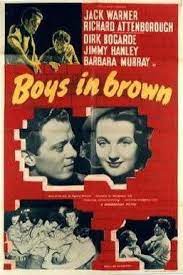
BOYS IN BROWN
UK, 1949, 85 minutes, Black-and-white.
Jack Warner, Richard Attenborough, Dirk Bogarde, Jimmy Hanley, Barbara Murray, Patrick Holt, Andrew Crawford, Thora Hird, Michael Medwin, Alfie Bass, Cyril Chamberlain.
Directed by Montgomery Tully.
Boys in Brown refers to the institution of the Borstal, not exactly a prison, but centres where boys and young men who have committed criminal offences are housed with the hope for rehabilitation and programs to assist this.
This is very much a film of the late 1940s, the post-war period, brief, in black and white, seasoned stars like Jack Warner (later with The Blue Lamp and his several hundred episodes of Dixon of Dock Green), Thora Hird, as well as up-and-coming actors like Richard Attenborough, Dirk Bogarde, Jimmy Hanley, Alfie Bass.
The focus here is on the character played by Richard Attenborough, a failed getaway attempt after a robbery, his going to the Borstal, trying to obey but entangled with some of those who are recalcitrant, wanting to escape. The most sinister is played by Dirk Bogarde, rather Machiavellian, something of a Iago and his sinister advice to Richard Attenborough and to bring him down.
There are emotional tangles, someone released (Jimmy Hanley) who visits the family, has a photo of the girlfriend (Barbara Murray) which Dirk Bogarde’s Iago uses to mislead Attenborough and to involve him in the escape. It comes to something of a melodramatic head with the escape and an attack on one of the staff.
This was an original play by actor in so many British films, Reginald Beckwith. Montgomery Tully was a director of this kind of film from the 40s to the 60s.
- Title? Criminal offences, the Borstal situation, prison/rehabilitation, the role of the authorities, the programs? Written in the 1940s?
- British film of the 1940s, the cast and their careers, Jack Warner and his status, black-and-white photography, issues? Social concern?
- The focus on Jackie, his background, easily led, his relationship with his mother, getaway driver, failure of the car, his being chased, arrested, the sentence, Borstal? Richard Attenborough and his performance on screen presence? His intention to serve at the time? The group, entering, the speeches, the Gov and his support? The mixed reaction of the group? Encounter with Alfie and his influence?
- Life of the Borstal, work, interactions, friendships, antipathy is? Theatre, rehearsals, Alfie and his performance? Labour?
- The group, planning the escape, Jackie not wanting to be part, their pressure on him, Alfie and his Machiavellian manipulation of Jackie?
- Jackie, the background, the friendship with Kitty, the photos, her visit? Jackie’s mother and his allowing her to come?
- Bill, serving his time, his background, intentions, leaving, the Borstal is part of the record, difficulty in getting a job, being targeted? Meeting Kitty, the attraction, the dance? Bill being caught up, the return, the photo with Kitty, Alfie and his manipulation, Jack and his motivations, forced to join the group?
- The plan, the escape, the confrontation with the member of staff, the violence, Jackie and his reaction, the man taken to hospital, the escape, everybody captured?
- The meeting with the governor and the authorities, his reaction, speeches, the recalcitrant Casey, Alfie being exposed, Jackie and his revolution to finish his sentence?
Origin of Evil, The/ L'Origine du Mal
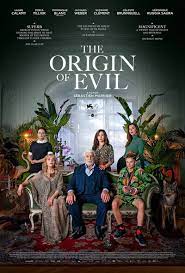
THE ORIGIN OF EVIL
France, 2022, 123 minutes, Colour.
Laure Calamy, Doria Tillier, Dominique Blanc, Jacques Weber, Suzanne Clement, Veronique Ruggia.
Directed by Sebastien Marnier.
This is one of those films that it is better to know very little or even nothing about it before seeing it. Which makes it very difficult to review, references to characters and plot. However, the advertising tagline states: Wickedly Comic French Thriller. And that is a way into a review without spoilers.
First, a comment on the title. While it is popularly are said that money is the root of all evil, the Scriptures actually say the love of money is the root of all evil. Love of money doesn’t necessarily say that one has money but rather money is the most desirable thing in life. And the Scriptures also say that Satan, the devil, in his evil is the father of lies. To that extent, the title is very relevant.
With love of money and lies at the centre of the film, the tagline is quite correct, we see quite a lot of wickedness, especially under what seem to be respectable surfaces.
The tagline also says comic, wickedly comic. But, this will very much depend on your sense of humour, and identification or not with the Gallic sense of humour. There are more than enough if he situations, some touches of farce, especially one character who has a mansion fall of years of expensive goods from Shopping Channels, spend a holiday! And, ultimately, quite a lot of irony.
So, response will depend on our liking for French cinema, especially for the actress, Laura Academy (Full Time, in the Ardennes) who certainly demands all our attention.
And, because the plot contains quite a number of elements of crime, deceit and danger, there are the thriller elements.
And, if this sounds interesting, enticing, there is a great deal to enjoy – this reviewer would have liked a couple of more minutes at the end. The film does leave it up to ourselves to make judgements and speculate as to what will happen, but there could have been some suggestions more! And, tantalisingly during the credits close-ups of a lot of those shopping channels purchases
- The title, traditionally money, love of money is root of evil? Satan as father of lies?
- The film described as both comic and thrilling?
- The story of Nathalie, with the audience meeting her as Stephane? At her apartment, landlady and affection, the daughter returning, her leaving, going to her friend Leila, working at canning the anchovies, the prison background, her phone call to Serge, hesitancy, second phone call, contact, the story of her mother, abandoned, seeking out Serge, revealing herself, his response, coming to the house, the encounter with Louise, the hostility of George, the daughter and her photographs, Agnes as stern? Her amazement at the house, warned not to come back, the private boat, her continued returns?
- The revelation at the middle of the film, the real Stephane, the lesbian relationship, Stephane in jail, murder of a lover, the mutual dependence? And the realisation what Nathalie was doing?
- The second half of the film, looking at Nathalie/Stephane differently, ingratiating herself, Serge becoming dependent, Louise becoming more friendly, the issue of Serge and his competence, Serge and his visit to Nathalie in the bath, the preparation for the testimony, his outbursts of rage? Anti-Semitic? Homophobic and his son?
- The preparation for the court case, Nathalie ingratiating herself with Serge, discovering Agnes and his stealing, Serge revealing this to the group, wanting the cottage for Nathalie, ousting Agnes, the hearing, Nathalie and her testimony, repeating the line that Serge had prepared, her change of tone, the revelations? Serge, his reaction, collapse?
- Serge in hospital, Nathalie with him, smothering him, George listening and observing, colluding?
- The irony of the real Stephane reading the newspaper, absconding from work, coming to the funeral, making a scene? The discovery of Nathalie? The confrontation, her coming to the house, Nathalie taking her to the passage that Louise had revealed, to the sea, attacking Stephane and killing her? Taking her phone?
- The family together, George playing the piano, everything seeming to be settled?
- The two guards, coming to the house, the fact that Stephane had sought permission to come, ringing her phone? The long final close-up of Nathalie’s face?
- The character of Serge, the past, womanising, despising his wife, his children, the antagonism with George, her forceful personality, running the business? Her wanting to have control over Serge? Louise, eccentric, the long marriage, tolerance, the shopping channels, her spending, spend a holiday? Becoming friendly with Nathalie? The granddaughter, Australia, taking photographs, wanting to leave the family and go back to Australia? Agnes, devotion to the family, for many decades, stern, servant, stealing from Louise? Louise accepting this?
- The real Stephane, her life, relationships, murder, in prison, the victim of Nathalie, identity theft, Nathalie and her reputation? Stephane and her desperate dependence, getting the news, going to the house, the confrontation, her death?
- The origin of evil, identity theft, money, lying?
Engineer, The
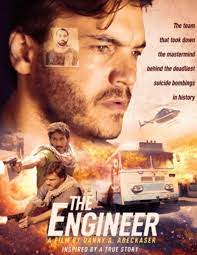
THE ENGINEER
US, 2023, 92 minutes, Colour.
Emile Hirsch, Danny A. Abeckaser, Angel Bonanni, Dan Mor, Adam Haloon, Robert Davi.
Directed by Danny A. Abeckaser.
It is 1995. There are a series of bombings, terrorist bombings, in Jerusalem and Tel Aviv. It is the time of peace talks of the 1990s, Oslo agreements, the visit of Israeli and Palestinian authorities, including Yasser Arafat, to Camp David and discussions with President Clinton. And, throughout the film, there are inserts of television news about the bombings, about the American meetings, of the assassination of Rabin, the assumption of authority and dealing with terrorism by Shimon Peres.
The name of the bomb maker and strategist for attacks was Yaya Ayyah but he was dubbed at the Engineer.
While the material is historical, this is an American treatment, much in the vein of an action drama. The director is Danny A. Abesecjer, who also appears as the Israeli coordinator of investigations. There are two teams investigating the bombings and trying to track down The Engineer. The first is an official Israeli group, led by Emile Hirsch, an interrogator, noted for extremes in his questioning and torture, suspended, but brought back. The second team is unofficial, led by a former mercenary, Angel Bonanni, who was summoned by a Florida senator, played by Robert Davi, whose daughter is killed in the initial explosion, graphically shown at the film’s opening. Other mercenaries are brought into the operation which is secret and undercover.
We are shown the different approaches of each group, abductions, interrogations with unofficial torture, undercover surveillance, with the two groups eventually confronting each other and then working together.
The running time of the film is comparatively brief. It plays fairly conventionally in terms of detection, action, confrontations. One of the difficulties is having Emile Hirsch in the central role – a more genial screen presence even when on the wrong side of the law, perhaps too pleasant to be convincing as such and interrogator-torturer. Angel Bonanni, as the leader of the undercover group, is more convincing. Another casting typically is Robert Davi in the role of the Senator, an actor who has been quickly and easily cast as a villain in so many films.
At the end, there is a statement that there is a desire for peace rather than attempts through violence – but, in fact, the final moment of the film is a Palestinian terrorist standing up in a bus and bombs exploding.
- The title, the terrorist, making bombs, the network, the terrorist bombings, consequences?
- An American perspective on characters and events? The international cast?
- Audience attitudes towards Israel, the Palestinians, terrorism, reprisals? The history of Israel and Palestine since 1948? Uprisings? Peace attempts?
- The opening, the suicide bomber preparing, the girl going to the bus stop, her comments, his entering the bus, pushing, praising God, the explosion? The consequences?
- Etan, at home, family, the birthday party, chocolate cake? Interrogator, torturing, suspended? His superior, calling him back? The situation? The other members of the team, their backgrounds? The two Palestinians, one shot, the other captured, the interrogation, his defiance, in time and his stances, the rules, the attempted smothering, the prisoner giving information? Surveillance, the house? Communications, the female operative, the surveillance of the house, the men approaching? The raid, the discovery of Avi and his team? The Senator? Past history? Tension? The decision to work together? The interrogation of the owner of the apartments, wanting money, his whisper, the information? Going on a helicopter ride? Substituting the phone? The plan for the detonation, in the phone, the helicopter ride, the aftermath, the failure? Retrieving the phone, substituting the bomb? The father and the phone call to the terrorist, checking the accuracy? The explosion, death? The final raid, the shootout?
- Avi, introduced, mercenary, his team and the interviews, recruiting them, mercenaries? Mossad in the past? Called by the senator, his relationship with the senator? The pressure on him? In Palestine, disguise, getting information, the raids, shooting? The arrival of the senator, the diplomatic difficulties, his being bent on revenge for his daughter, the time and having to include him? The final raid, the news, Avi’s death?
- The information throughout the film, news about the bombings, the terrorists, statistics? The meetings between Israel and Palestine, Arafat, President Clinton? On the assassination of the Israeli Prime Minister? The events of 1996?
- The human touches throughout the film, Avi seeing his wife and daughter, clashes? The town and his family, relationship with his wife?
- The film receiving unfavourable reviews? A way into understanding 1995 and terrorist tensions? The final image of the woman terrorist in the bus after the information about attempts for peace, rather than through violence?
I'll Be Frank
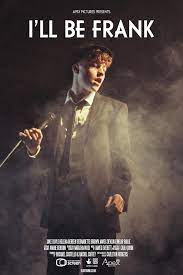
I’LL BE FRANK
Australia, 2023, 54 minutes, Colour.
Voice: John Gaden.
Directed by Aaron Frank.
A personal investigation of ancestry by Australian, Aaron Frank, who features in the film personally, has directed and edited the film.
The Frank of the title is his grandfather who migrated from Germany in 1939, arriving in Australia, settling there and having a fruitful life as the doctor. There are some clips of him at various functions inserted throughout this documentary. However, his grandson, Aaron, has gone to Germany, wanting to find out more about his grandfather, about the situation of Jews in Germany, noting that many Germans who were deprived of their German citizenship between 1939 and 1945 were offered it again. Which means that he also has a German passport – and was questioned on arrival in Germany by the passport officer, asking about his German passport and his speaking German or not.
Aaron is very personable on screen, and very personal, very emotional, sometimes weeping. In the opening of the film, he is going back to the address of his grandfather, the original house bombed, a very modern and comfortable reconstruction adjacent to a park. He also visits the village where his grandfather had originally come from.
He has a manuscript written by his grandfather and reads from it, quotes from it, photos, statistics, information about his grandfather’s father and mother, his uncle who went to Holland, married, but was arrested with wife and son and killed in the concentration camps. He built up quite a picture of life in the 1920s and 1930s as well as moving around Berlin and trying to appreciate what happened during the Nazi era. His very much moved the story, through a phone call from a friend of the family in Holland, who gives him the information about the family’s death. He weeps.
He invites audiences to empathise with him, his pride in his Judaism and his heritage, his search to understand his ancestry, his admiration for his grandfather.
During the final credits there are interviews with Australians with German ancestry, some happy to explore it, others treating their German citizenship with antipathy.
3 Days in Quiberon
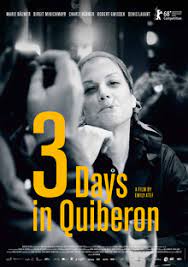
3 DAYS IN QUIBERON
Germany, 2018, 115 minutes, Black-and-white.
Marie Baumer, Birgit Minichmayr, Charlie Hubner, Robert Gwisdeck, Denis Lavant, Christopher Buchholz, Vicki Krieps.
Directed by Emily Atef.
Romy Schneider was a significant actress first in German cinema from the 1950s, then making a wide range of international appearances with directors like Orson Welles, Otto Preminger, then making a name for herself in French cinema in the 1960s and 70s. She died in 1982.
This is a film portrait as well as something of a tribute, written and directed by Emily Atef. As the title suggests, the action takes place over three days, Romy Schneider in rehabilitation for alcohol and drug addiction. She is in something of a bad way, her son not communicating with her, missing her daughter, upset that her second husband had hanged himself.
Romy Schneider is loyal to her mother, but her mother, Magda, was dominating in her career, especially in the early Sissi films, her mother having played Sissi in her own career. Her mother guided and controlled her career.
The occasion of the three days is a final interview with a journalist, hard and hostile, from Dear Stern, accompanied by a photographer who has many photo sessions with the actress and is an emotional support for her. Also visiting is her friend from school days, Hilde (Birgit Minchimayr) who understands her, comforts her, listens to her, tries to influence the questions of the interviewer, falls out with Romy but is concerned about her health and stays despite an intention to leave.
Marie Baumer resembles Romy Schneider in her later years, takes on her manner and mannerisms, re-creating a credible portrait of the actress at this stage of her life.
There is an aftermath, a year later, Romy Schneider with her daughter, the visit from the photographer, her giving permission for the article to be published with a deletion critical of her mother but an assertion that the actress intended to go on living and working. Sadly, she died not long afterwards.
- Audience knowledge of Romy Schneider? Her career, the range of films, Sissi, German films, International, top directors, her career in France? Her life, relationships, her mother, husbands, children, friends? Drug and alcohol dependancies? Her death?
- The title, the focus on Romy Schneider in her early 40s, discussions about her career and films, discussions about the strong influence her mother, her mother portraying Sissi, Romy Schneider’s early films, the influence of her mother on her career? The suicide of her husband? The alienation from her son? Love for her daughter? In France, her career? Her reputation in Germany?
- The performance, Romy Schneider and the actress’s appearance, likeness, mannerisms, in her room, the rehabilitation, with her friends, her reactions to the interviews, the photo sessions, going out, friendly, drinking? The clashes with Hilde, the hard nights, Robert and his support? Her going out onto the rocks, breaking her ankle, the difficulties with her next film?
- Hilde, childhood friend, support, knowing all about Romy, the visit, the hotel, companionship, talking, support, during the interview and photo sessions, the drinking afterwards, the clash, her deciding to leave, staying, support, the reconciliation?
- The issue of the interview, Charley, his background, family, interviewing celebrities, harsh attitudes? Questions, interrogation, her questioning him, then his probing her life, the past, her frank talking about her life, her children? The ending of the interviewer, Hilde’s intervention?
- Robert, the photo sessions, knowing Romy, his support, in the restaurant, the drinking, the photos? Going to her room, supporting her during the night, waking, the search for her?
- The aftermath, the continuing of the interview?
- One year later, Romy with her daughter, Robert, the text of the interview, her not wanting her mother-to-be hurt, and crossing out the indications that she was crazy, saying she wanted to live life to the full.
- The irony of the discussions about her last film? The last interviews and photo sessions?
- A tribute to Romy Schneider and her career? A portrait, her personality?
Retribution/ 2023
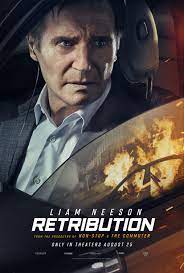
RETRIBUTION
US, 2023, 91 minutes, Colour.
Liam Neeson, Jack Champion, Lilly Aspell, Matthew Modine, Noma Dumezweni, Embeth Davidtz. Directed by Nimrod Antal.
Since 2008, Liam Neeson’s career has embraced action thrillers, at least one every year for 15 years (and more to come). His fans enjoy these thrillers, not necessarily the greatest thrillers, but Liam Neeson does have a strong screen presence and his writers and directors provide a variety of action situations. As does Hungarian-American director, Nimrod Antal, with Retribution.
This is a reasonable contribution to Liam Neeson’s action repertoire, plenty of tension.
However, in checking out reviews and bloggers, it would seem that many anti-Neeson bloggers are masochists. They are prone to dislike the film. Off they go. They sit all through it, allegedly suffering because of how bad it is, then indulge themselves by often virulent online responses. this sledging phenomenon would be worth some serious study as to how of these non-fans tick.
But, back to Retribution. It is set in Berlin, with some fine vistas and locations in the city. It opens with some tension, Matt (Liam Neeson) preparing to go to work, some edge with his wife (Embeth Davidtz), a lively an agreeable young daughter (Lilly Aspell) and a surly teenage son (Jack Champion). He is very busy with business, banking, but is forced to drive them to school. And, on the television, we have seen a car exploding at the Tiergarten.
The screenplay is written as if it all takes place in real time which also builds tension. Even though it is a Liam Neeson action show, he spends practically the whole of the film sitting at the wheel of a car. And, well he might, because he receives a mysterious call from a disguised voice, threatening that there is a bomb under the car seats, ordering no one to leave the car, drive to various destinations (and another explosion killing a work colleague), a phone call to his wife, to retrieve a box from the bank, anxiety on the part of the children, his wife, and concern for the international police. He then faces an even greater crisis when the mysterious voice urges him to kill his partner at the bank, played by Matthew Modine.
There are quite a number of vivid car chases around Berlin, the police closing in, his daughter seriously injured in her leg by flying shrapnel from the explosion.
However, this is a Liam Neeson film and so finally he goes into action bribing wheel, to discover and confront the mysterious voice threatening him. Which he does – and very dramatically.
So, for those who enjoy these basic action thrillers and are prepared to spend 90 minutes, Liam Neeson, experiencing the tension in the drama, why not Retribution?
- Liam Neeson action thriller? So many in the latter part of his career? Audience expectations?
- The title, crime, endangering the lives, retribution?
- The German setting, the city of Berlin, the landmarks, the streets, buildings, police, Europol?
- The opening, Matt and his exercise, shower, meal, everything in order? Relationship with his wife? His daughter, Zach and the clashes with his father? The mother wanting Matt to take the children to school, the touch of tantrums? Establishing tension, pace?
- The action taking place with the impression of action in real time? Contributing to tension?
- Emily, her age, the phone, bonds with her father? Zach, sullen, forced to getting the car, his phone, girlfriend?
- The phone call, the disguised voice, the threats, the bomb under the seat, the background of Matt watching television and the explosion of the car at Tiergarten? Told to drive, the threats to the children, the phone call to his wife, her not answering, her friend, indication of the divorce, the wife ringing back, the task to go to the bank, retrieve the box, deliver it to the man in blue – and the irony of the police swooping on him and taking him?
- The mystery for Matt, his banking background, the phone call from Anders, their friendship? The phone call from Sylvain, the threats, his girlfriend upset, not to get out of the car, the police coming, her getting out, the explosion? The rendezvous, the meeting with Anders, his being told to shoot him, Matt and his dilemma, unable to shoot, the train going past? The explosion?
- The issue of the money, the voice telling him to sign away the money in Dubai, the millions of euros? The effect on Matt, the growing tension, the phones, the interactions with his children, their change, supporting him? Emily and the injury from the explosion?
- Driving, the dangerous chase throughout the city, the police?
- The revelation concerning Anders, betrayal, greed, the plan, even covering his death?
- The police closing in on Matt, tensions, the inspector, her suspicions, Matt pleading, Emily taken to the hospital, talking with his wife, a possible reconciliation and forgiveness, Zach free?
- Matt, the drive, the encounter with Anders, the wrecked car with the doors missing, the protest procession, the man in the mask, getting into the car, the revelation? The explanations? Matt deciding to drive, to crash the car, Matt getting free and going into the River? Anders reaching for his phone, the explosion?
- And the final information being given through the final credits?
It Lives Inside
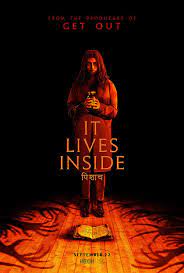
IT LIVES INSIDE
US, 2023, 99 minutes, Colour.
Megan Suri, Neeru Bajwa, Mohana Krishnan, Betty Gabriel, Gage Marsh.
Directed by Bishal Dutta.
Yet another small American horror film, capitalising on the mysterious word “It”. Stephen King used it to great advantage. Various titles have been popular, variants on It’s Alive. It Came from Outer Space… So, once again, It’s Alive, but taking possession of people. It Lives Inside.
This is a teen horror film, for high schoolers and young adults. An immediate difference from the small American town and high school and student interactions, which it is, is the fact that the central character, Samidha,, preferring to be called Sam, making every effort to fit in with her very American peers (rather selfie-obsessed), belongs to an Indian American migrant family (as different from American Indians, Native Americans). And the writer-director, Bishal Dutta, comes from this kind of background.
With the Indian cultural and religious rituals and ceremonies, there is a variation on the kind of horror folklore that can be invoked. This time it is an evil spirit from the Indian tradition, who needs to be appeased with various ceremonies, including elaborate cooking of food and food offerings, but who actually feeds on malevolent attitudes.
A boy has killed himself. Sam’s best friend from the past, Tamira, seems to be possessed, a grim relic of her past self. But, she has contained the evil spirit in a bottle – which is smashed. The spirit roams again, eventually taking form as a giant horror creature, demonic.
There is trauma at home with Sam’s mother resentful of American culture and lifestyle, while her father is sympathetic. There is also a sympathetic counsellor at school who researches the mythologies and, of course, becomes the victim of horror pursuit through the corridors of the school. And, there is a nice American boy who is keen on Sam – but, to our surprise, the relationship is short lived (as is he).
A boarded-up house, hauntings, weird paintings on the roof, Tamira’s journal from the suicidal boy with all kinds of Hindi writing, symbolic numbers, and a confrontation between Sam and the Demon.
It all ends one year later – and, of course, leaves itself open for It Lives Inside 2.
- Teen horror movie? Adults? High schoolers? Target audience?
- The American town, homes, the Indian American family, celebrations, traditions, superstitions? School? The haunted house? Musical score?
- Samidha, Indian family background, wanting to fit in, called Sam? Age? Wilful attitudes? Modern American, selfies…? Clashes with her parents? At school, the students, Joyce, confidante? Friendship with Russ, going to the party? The past friendship with Tamira?
- The sinister events, the death of the boy, the boarded-up house, Sam and Russ exploring, the dark, the paintings and symbolism, the basement?
- The family, the mother yearning for India, critical of American lifestyle, the sympathetic father? The preparation for the feast, Sam not wanting to cook, going out? The background of the feast, the spirit, appeasement, the food?
- Tamira at school, appearing and disappearing, confronting Sam, the jar, the glow, the breaking of the jar, the freeing of the evil spirit?
- The manifestations of the spirit, Sam with Russ, the joint, the attack, the swings, his death?
- Sam and her going to Joyce, Joyce and her consideration, doing the research, her being persecuted in the school building?
- Sam at home, the father’s return, the spirit, his being attacked and wounded?
- Sam, haunted, at home, the ritual celebration, the cooking of the food, the offering? Sermon her experiences, the Demon, conflicts, Tamira, Sam absorbing the spirit?
- The year later, Tamira better, the happy family gathering, her father revived, Joyce present?
- Yet the suggestion that further horror stories?
Accused/ 2023
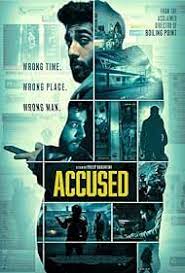
ACCUSED
UK, 2023, 88 minutes, Colour.
Chaneil Kular, Nitri Ginatra, Nila Aalia, Lauryn Ajufo, Frances Tomelty, Robbie O'Neill, Jay Johnson. Directed by Philip Barantini.
Here is a film well worth seeing in this complex social media age, with unlimited access to social media, open for anyone to express their opinions, favourable or, especially, hostile, and promote conspiracies and fake news.
This is a brief film that becomes ever more intense.
The central character is Harri (Chaneil Kular), a young man of British Pakistani background, seen in a relationship, travelling to the country to his family’s home to take care of it while they go on holiday. So far, so ordinary. A story that most audiences can identify with – and Harri is cheerful and friendly.
He is a young bearded man, dark, wearing a hoody at the Central London Station – and a similarly dressed man passes him on the escalator. Harri has his phone, relies on it for communication and news, during the train trip news of a terrorist bomb blast at the station. Remembering the man on the escalator, we can guess what is going to happen. And it does. And more.
Harri has a wonderful meal with his parents. Off they go on a holiday. He is in a nice house, watches TV (an old Frankenstein movie), gradually learning more about the bombing. But, the social media are buzzing, condemnations of the terrorist, racist outbursts, vindictive calls for vengeance, the photo of the man in the hoody, someone posting that the photo reminds her of Harri, bloggers and social media devotees investigating, finding his apartment, his girlfriend, his parents house…
While Harri rings the police to explain the situation, there is no action. But, in the early hours, home invasion, pursuit, the killing of his dog, threats, his escaping on to the roof, falling into the swimming pool, fleeing through the woods to a sympathetic neighbour, but her finding out about the situation and suspicious.
Harri is brutalised but uses his wits, injured but surviving…
We can say that this could happen to anyone given circumstances – but, in the Anglo world, young bearded men of some colour are automatic targets of suspicion.
- The direct title? Harri, ordinary life, circumstantial evidence, named, persecuted, social media trolling, victimisation, violence?
- The London setting, a universal story in an age of social media, Facebook and social media and instant access, information, misinformation?
- The introduction to Harri, his Pakistani background, work in animation, his relationship with Chloe, the situation with his parents, their holiday, going to the railway station, noticing the man with the hoody, travelling and his father meeting him, the welcome, the meal with his parents, the good spirit in the family, their going on holidays, his relaxing?
- The media, television, phones, information about the bombing?
- The photo of the man with the hoody, similar to Harri, the variety of responses on social media, instant, the girl noting the photo reminded her of Harri, the responses, vengeance, vindictiveness, racism, bigotry, threats of violence? The gradual identification of Harri, information about his parents, his apartment, Chloe, his family home?
- Harri, watching Frankenstein on television, gradually getting the news about the bombing and the accusations? His reaction? Phoning the police? Phoning Chloe? Her response?
- Harri and the dog, bringing the dog in, noises in the house, his looking all the windows? Finding the dog dead?
- The drama of home invasion, the two men, ordinary, masked, intruding, tracking Harri, inside the house, upstairs, his getting out the window, on the roof, falling into the pool, running through the woods?
- His arrival and waving to the neighbour, running to her house, her letting him in, the towels, cup of tea, the news, her suspicions and fears, the knife? The police?
- His escaping again, the woods, getting the keys of the car, the intruder at the car, the clash, the fight, Harri and the broken shard, the intruder’s death, the other man with the bat, Harri and the previous scene in his treehouse, escaping into the house, the intruder pursuing, treading on the floor, falling through the floor, impaled, pleading with Harri?
- The audience identifying with Harri, the innocent, accused, fear, pressure, the police, violent and injury?
- Th coming e aftermath, with his family, the interviewer wanting to get to the truth?
- The credibility of the story, misinformation on social media, conspiracies, rash judging, violence and bigotry revealed? And the victims?
Ruby Gilman, Teenage Kraken
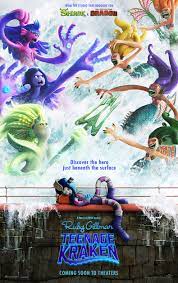
RUBY GILMAN, TEENAGE KRAKEN
US, 2023, 91 minutes, Colour.
Voices of: Lana Condor, Jane Fonda, Toni Collette, Colman Domingo, Annie Murphy, Sam Richardson, Will Forte, Blue Chapman, Jaboukie Young-White.
Directed by Kirk DeMicco.
The mythology of the Kraken. And we are surprised to find a teenage Kraken.
Here is an animation film for the teenage audience, for teenage girls. There are a few boys about that they are not really essential to this plot even Ruby’s school boyfriend.
Who is Ruby Gilman? Actually, Ruby lives with her parents and with her younger brother, a seemingly quiet life. But, the audience has been prepared with an initial voice-over, sounding particularly like Jane Fonda – and it is. She is visualised as a giant Kraken, dressed in yellow, quite an imposing figure to look at and to listen to.
Ruby has no idea who she is, so protected by her mother, also a Kraken, forbidding Ruby to go near to the water. When Ruby rescues a fellow student, she discovers a glow in her body, and she transforms into the giant Kraken. She confronts her mother, goes to find her grandmother, Jane Fonda, telling the truth, that Ruby is the heir apparent, and to do some training with her.
While there are sequences of the family conflicts, especially with the protective mother, the nice father, the genial uncle and the little brother, there is also a malicious mermaid, taking the form of a student, but eventually manifesting her evil self to build up to a dramatic confrontation and fight with Ruby.
Ruby has to accept herself, to reconcile with her mother and discover the power that her mother had in the past, especially imprisoning the mermaid. So, while Ruby has discovered her inner self, accepted it, cresponded to the challenge, is able to mix so much better with her school friends, go to the dance with the bashful boyfriend, she will one day take her grandmother’s place and be the supreme Kraken.
There is a strong voice cast with Lana Condor as Ruby, Tony Collette as her mother, Colman Domingo as her father. (And a good cinema Trivial Pursuit question: what is the film in which Jane Fonda played Toni Collette’s mother?!)